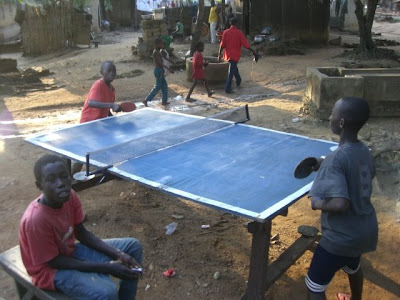 I've learned that playing table-tennis here is a good way to make friends, earn trust, and learn about Ghanaian culture. But it's not quite the same as it is back home.
I've learned that playing table-tennis here is a good way to make friends, earn trust, and learn about Ghanaian culture. But it's not quite the same as it is back home.In Michigan, I have a ping-pong table in my basement. It's a beautiful table with hardly a scratch on the surface. Our paddles are well kept, and if they ever started to tear I used to drive out to a local sports store to replace them with the new, cool, professional-style paddles. My basement's floor is also flat.
Over here in Ghana - where I'm convinced that 'table tennis' (not ping-pong) is the second most popular sport behind soccer - the playing conditions and equipment are a bit different. The table wasn't bought, but built. The paddles, some of which are wrapped in black electric tape, have been used for an endless number of hours on every day that it hasn't rained (and on some that it has) for over a year. And the wooden surface (rotted and slanted in some corners) sits upon a slight hill next to the main road through the village, requiring players to alternate sides at the end of the first game, and halfway through the third game, to be fair.

Over the course of the last few weeks, I've played more than a hundred games of table tennis, and count each of the more than 20 competitors I've faced as a new friend. Initially, most were surprised to learn that the 'obruni' knew how to play the game at all. But after watching me win more than I tend to lose, and do it with a smile and a handshake after each match, the guys in the village now count me as a respectable opponent.
Because of the emphasis on community, trust and integrity are the backbone of a Ghanaian's reputation. Playing table tennis allows me to prove my value of fair play, honesty (did the ball hit the side or top of the table?), and integrity over time.
And the greatest part of it all? The players are incredible. Playing in basement ping-pong tournaments back in the day prepared me somewhat for the talent pool here. But, for better or worse, while American children are studying, riding bikes, going to organized sports practices and dance recitals and heading off to the mall, the children in Marfokrom (who aren't playing soccer) are playing table tennis. This accounts for why it took me over a week to beat the 12 year old boys here, and why I'm just now getting good enough to win consistently with some of my peers.
